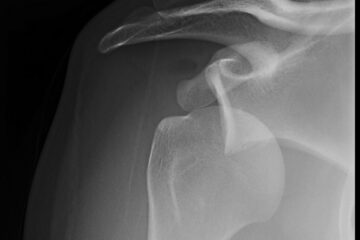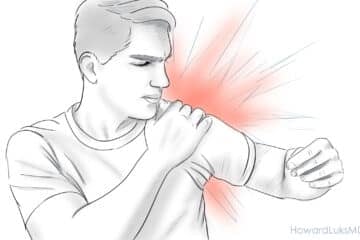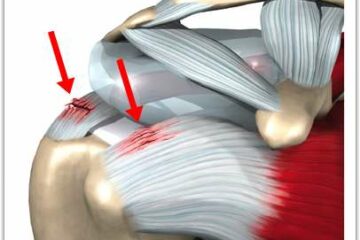
What is a Shoulder Dislocation?
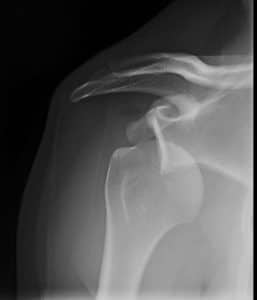
A shoulder dislocation is present when the ball (the top of the humerus) of the shoulder is no longer in contact with the socket (glenoid). Most shoulder dislocations occur as a result of a traumatic injury where an athlete is hit hard, falls onto the shoulder or falls with their arm stretched out in front of them. The athlete will generally feel a pop and be unable to move the arm.
Why Did My Shoulder Dislocate?
The shoulder is an incredible joint. It allows for a phenomenal range of motion, yet it stays located, or in its normal position… usually. The shoulder is a simple ball and socket joint.. except the ball is rather large, and the socket is flat and rather small. Think a golf ball on a golf tee. Just a little breeze and the ball falls off :-(. The bones are held together by ligaments. Ligaments are very tough strong tissues that connect the ball to the socket and help to keep it from falling off. As I just mentioned… the socket of the shoulder is flat. Therefore it needs the assistance of a structure we call the labrum to build up the edges. The labrum surrounds the entire socket and functions to deepen the socket, and it serves as a bumper to prevent a shoulder dislocation. In addition, the labrum serves as another anchor point for the attachment of the ligaments. So, the ligaments and the labrum together aid in preventing your shoulder from dislocating.
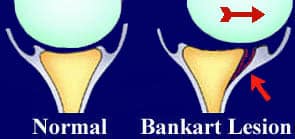
What is the initial treatment for a shoulder dislocation?
For some of you, your shoulder dislocation required a trip to the Emergency Room. In some situations, the shoulder actually reduces or goes back into place on the field when you or your trainer or coach try to help you get up and off the field. Sometimes a fracture occurs when your shoulder dislocates, so an X-ray within a reasonable period of time is a good idea.
Unfortunately, the labral tear or Bankart lesion I just described does not “reduce” or go back into place after the shoulder is put back into position. The labrum stays away from the socket, and “heals” in this improper position. This is why you are at risk for another shoulder dislocation or a recurrence. The risk of recurrence or another dislocation depends on your age and a few other factors. The younger you are, the higher the risk that your shoulder will dislocate again. If you are under 18 you are at very high risk for another dislocation. Between 21 and 25 you are at moderately higher risk, and beyond 30 the risk goes down significantly.
Do you have questions regarding an Orthopedic injury or longevity?
Do you want to talk to an expert who can listen to you for 45-60 minutes and explain the options in detail?
Dr. Howard Luks offers remote guidance sessions to review your X-ray or MRI images and explain your options.
Dr. Luks has also received hundreds of requests for educational sessions on the topics discussed in his book, Longevity Simplified.

